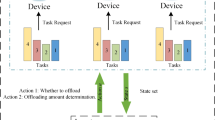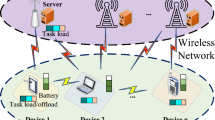Abstract
Mobile Edge Computing (MEC) is a promising approach. Dynamic service migration is a key technology in MEC. In order to maintain the continuity of services in a dynamic environment, mobile users need to migrate tasks between multiple servers in real time. Due to the uncertainty of movement, frequent migration will increase delays and costs and non-migration will lead to service interruption. Therefore, it is very challenging to design an optimal migration strategy. In this paper, we investigate the multi-user task migration problem in a dynamic environment and minimizes the average service delay while meeting the migration cost. In order to optimize the service delay and migration cost, we propose an adaptive weight deep deterministic policy gradient (AWDDPG) algorithm. And distributed execution and centralized training are adopted to solve the high-dimensional problem. Experiments show that the proposed algorithm can greatly reduce the migration cost and service delay compared with the other related algorithms.
Similar content being viewed by others
References
Zhang D G, Wang J X, Zhang J X, Zhang T, Yang C, Jiang K W. A new method of fuzzy multicriteria routing in vehicle Ad Hoc network. IEEE Transactions on Computational Social Systems, 2022, doi: https://doi.org/10.1109/TCSS.2022.3193739
Zhang D, Li G, Zheng K, Ming X, Pan Z H. An energy-balanced routing method based on forward-aware factor for Wireless Sensor Networks. IEEE Transactions on Industrial Informatics, 2014, 10(1): 766–773
Liu S, Zhang D, Liu X, Zhang T, Wu H. Adaptive repair algorithm for TORA routing protocol based on flood control strategy. Computer Communications, 2020, 151: 437–448
Zhang D G, Dong W M, Zhang T, Zhang P, Zhang P, Sun G X, Cao Y H. New computing tasks offloading method for MEC based on prospect theory framework. IEEE Transactions on Computational Social Systems, 2022, doi: https://doi.org/10.1109/TCSS.2022.3228692
Zhang D G, Niu H L, Liu S. Novel PEECR-based clustering routing approach. Soft Computing, 2017, 21(24): 7313–7323
Chen J, Zhang L, Liang Y C, Kang X, Zhang R. Resource allocation for wireless-powered IoT networks with short packet communication. IEEE Transactions on Wireless Communications, 2019, 18(2): 1447–1461
Shan L, Gao S, Chen S, Xu M, Zhang F, Bao X, Chen M. Energy-efficient resource allocation in NOMA-integrated V2X networks. Computer Communications, 2023, 197: 23–33
Zhang D, Wang W, Zhang J, Zhang T, Du J, Yang C. Novel edge caching approach based on multi-agent deep reinforcement learning for internet of vehicles. IEEE Transactions on Intelligent Transportation Systems, 2023, doi: https://doi.org/10.1109/TITS.2023.3264553
Yang J, Ding M, Mao G, Lin Z, Zhang D G, Luan T H. Optimal base station antenna downtilt in downlink cellular networks. IEEE Transactions on Wireless Communications, 2019, 18(3): 1779–1791
Zhang D G, Cui Y Y, Zhang T. New quantum-genetic based OLSR protocol (QG-OLSR) for mobile Ad hoc network. Applied Soft Computing, 2019, 80: 285–296
Zhang D, Ge H, Zhang T, Cui Y Y, Liu X, Mao G. New multi-hop clustering algorithm for vehicular Ad Hoc networks. IEEE Transactions on Intelligent Transportation Systems, 2019, 20(4): 1517–1530
Chen J, Mao G, Li C, Liang W, Zhang D G. Capacity of cooperative vehicular networks with infrastructure support: multiuser case. IEEE Transactions on Vehicular Technology, 2018, 67(2): 1546–1560
Zhang T, Zhang D G, Yan H R, Qiu J N, Gao J X. A new method of data missing estimation with FNN-based tensor heterogeneous ensemble learning for internet of vehicle. Neurocomputing, 2021, 420: 98–110
Chen L, Zhang D G, Zhang J, Zhang T, Du J Y, Fan H R. An approach of flow compensation incentive based on Q-learning strategy for IoT user privacy protection. AEU-International Journal of Electronics and Communications, 2022, 148: 154172
Zhang D G, Liu S, Liu X H, Zhang T, Cui Y Y. Novel dynamic source routing protocol (DSR) based on genetic algorithm-bacterial foraging optimization (GA - BFO). International Journal of Communication Systems, 2018, 31(18): e3824
Zhang D, Wang X, Song X, Zhao D. A novel approach to mapped correlation of ID for RFID anti-collision. IEEE Transactions on Services Computing, 2014, 7(4): 741–748
Liu S, Zhang D G, Liu X H, Zhang T, Gao J X, Gong C L, Cui Y Y. Dynamic analysis for the average shortest path length of mobile Ad Hoc networks under random failure scenarios. IEEE Access, 2019, 7: 21343–21358
Zhang D G, Wu H, Zhao P Z, Liu X H, Cui Y Y, Chen L, Zhang T. New approach of multi-path reliable transmission for marginal wireless sensor network. Wireless Networks, 2020, 26(2): 1503–1517
Zhang D G, Ni C H, Zhang J, Zhang T, Zhang Z H. New method of vehicle cooperative communication based on fuzzy logic and signaling game strategy. Future Generation Computer Systems, 2023, 142: 131–149
Cui Y, Zhang D, Zhang T, Chen L, Piao M, Zhu H. Novel method of mobile edge computation offloading based on evolutionary game strategy for IoT devices. AEU-International Journal of Electronics and Communications, 2020, 118: 153134
Zhang D, Cao L, Zhu H, Zhang T, Du J, Jiang K. Task offloading method of edge computing in internet of vehicles based on deep reinforcement learning. Cluster Computing, 2022, 25(2): 1175–1187
Zhang J, Piao M J, Zhang D G, Zhang J, Dong W M. An approach of multi-objective computing task offloading scheduling based NSGS for IOV in 5G. Cluster Computing, 2022, 25(6): 4203–4219
Zhang D, Shuo W, Zhang J, Zhu H, Zhang T, Zheng X. A content distribution method of internet of vehicles based on edge cache and immune cloning strategy. Ad Hoc Networks, 2023, 138: 103012
Zhang D, Piao M, Zhang T, Chen C, Zhu H. New algorithm of multi-strategy channel allocation for edge computing. AEU-International Journal of Electronics and Communications, 2020, 126: 153372
Cui Y Y, Zhang D G, Zhang T, Zhang J, Piao M. A novel offloading scheduling method for mobile application in mobile edge computing. Wireless Networks, 2022, 28(6): 2345–2363
Xiao L, Lu X, Xu T, Wan X, Ji W, Zhang Y. Reinforcement learning-based mobile offloading for edge computing against jamming and interference. IEEE Transactions on Communications, 2020, 68(10): 6114–6126
Guan S, Boukerche A. Design and implementation of offloading and resource management techniques in a mobile cloud environment. In: Proceedings of the 17th ACM International Symposium on Mobility Management and Wireless Access. 2019, 97–102
Guan S, Boukerche A. A MEC-based distributed offloading model for ubiquitous and time-constraint offloading. In: Proceedings of the 23rd IEEE/ACM International Symposium on Distributed Simulation and Real Time Applications. 2019, 1–8
Guan S, De Grande R E, Boukerche A. A multi-layered scheme for distributed simulations on the cloud environment. IEEE Transactions on Cloud Computing, 2019, 7(1): 5–18
Nadembega A, Hafid A, Taleb T. A destination and mobility path prediction scheme for mobile networks. IEEE Transactions on Vehicular Technology, 2015, 64(6): 2577–2590
Tang Z, Zhou X, Zhang F, Jia W, Zhao W. Migration modeling and learning algorithms for containers in fog computing. IEEE Transactions on Services Computing, 2019, 12(5): 712–725
Yuan Q, Li J, Zhou H, Lin T, Luo G, Shen X. A joint service migration and mobility optimization approach for vehicular edge computing. IEEE Transactions on Vehicular Technology, 2020, 69(8): 9041–9052
Wang S, Urgaonkar R, He T, Chan K, Zafer M, Leung K K. Dynamic service placement for mobile micro-clouds with predicted future costs. IEEE Transactions on Parallel and Distributed Systems, 2017, 28(4): 1002–1016
Plachy J, Becvar Z, Strinati E C. Dynamic resource allocation exploiting mobility prediction in mobile edge computing. In: Proceedings of the 27th IEEE Annual International Symposium on Personal, Indoor, and Mobile Radio Communications (PIMRC). 2016, 1–6
Nadembega A, Hafid A S, Brisebois R. Mobility prediction model-based service migration procedure for follow me cloud to support QoS and QoE. In: Proceedings of 2016 IEEE International Conference on Communications (ICC). 2016, 1–6
Aissioui A, Ksentini A, Gueroui A M, Taleb T. On enabling 5G automotive systems using follow me edge-cloud concept. IEEE Transactions on Vehicular Technology, 2018, 67(6): 5302–5316
Zhang W, Chen J, Zhang Y, Raychaudhuri D. Towards efficient edge cloud augmentation for virtual reality MMOGS. In: Proceedings of the 2nd ACM/IEEE Symposium on Edge Computing. 2017, 8
Zhang C, Zheng Z. Task migration for mobile edge computing using deep reinforcement learning. Future Generation Computer Systems, 2019, 96: 111–118
Gao Z, Jiao Q, Xiao K, Wang Q, Mo Z, Yang Y. Deep reinforcement learning based service migration strategy for edge computing. In: Proceedings of 2019 IEEE International Conference on Service-Oriented System Engineering (SOSE). 2019, 116–1165
Li M, Si P, Zhang Y. Delay-tolerant data traffic to software-defined vehicular networks with mobile edge computing in smart city. IEEE Transactions on Vehicular Technology, 2018, 67(10): 9073–9086
He Y, Zhao N, Yin H. Integrated networking, caching, and computing for connected vehicles: a deep reinforcement learning approach. IEEE Transactions on Vehicular Technology, 2018, 67(1): 44–45
Peng H, Shen X. Deep reinforcement learning based resource management for multi-access edge computing in vehicular networks. IEEE Transactions on Network Science and Engineering, 2020, 7(4): 2416–2428
Schaul T, Quan J, Antonoglou I, Silver D. Prioritized experience replay. In: Proceedings of the 4th International Conference on Learning Representations. 2016, 1–23
Lillicrap T P, Hunt J J, Pritzel A, Heess N, Erez T, Tassa Y, Silver D, Wierstra D. Continuous control with deep reinforcement learning. In: Proceedings of the 4th International Conference on Learning Representations. 2016, 1–14
Foerster J N, Assael Y M, De Freitas N, Whiteson S. Learning to communicate with deep multi-agent reinforcement learning. In: Proceedings of the 30th International Conference on Neural Information Processing Systems. 2016, 2145–2153
Park S W, Boukerche A, Guan S. A novel deep reinforcement learning based service migration model for mobile edge computing. In: Proceedings of the 24th IEEE/ACM International Symposium on Distributed Simulation and Real Time Applications (DS-RT). 2020, 1–8
Ma L, Yi S, Li Q. Efficient service handoff across edge servers via docker container migration. In: Proceedings of the 2nd ACM/IEEE Symposium on Edge Computing. 2017, 11
Liu C, Tang F, Hu Y, Li K, Tang Z, Li K. Distributed task migration optimization in MEC by extending multi-agent deep reinforcement learning approach. IEEE Transactions on Parallel and Distributed Systems, 2021, 32(7): 1603–1614
Liu N, Li Z, Xu J, Xu Z, Lin S, Qiu Q, Tang J, Wang Y. A hierarchical framework of cloud resource allocation and power management using deep reinforcement learning. In: Proceedings of the 37th IEEE International Conference on Distributed Computing Systems. 2017, 372–382
Acknowledgements
This work was supported by the Basic Science (Natural Science) Research Project of Colleges and universities in Jiangsu Province (22KJB520017).
Author information
Authors and Affiliations
Corresponding author
Additional information
Yuya Cui was a Member of IEEE in 2017. He received his PhD degree from School of Computer Science and Engineering, Tianjin University of Technology, China in 2021, and is currently working at the School of Internet of Things Engineering, Jiangsu Vocational College of Information Technology, China. His research interests include WSN, mobile computing, etc.
Degan Zhang received his PhD degree from Northeastern University, China. Now he is a professor of Tianjin Key Lab of Intelligent Computing and Novel Software Technology, Tianjin University of Technology, China. His research interest includes service computing, etc.
Jie Zhang was a Member of IEEE in 2020. Now he is a researcher of the School of Electronic and Information Engineering, Beijing Jiaotong University, China. His research interest includes IoT, mobile computing, etc.
Ting Zhang was a Member of IEEE in 2008. Now she is a professor of School of Sports Economics and Management, Tianjin University of Sport, China. Her research interest includes ITS, WSN, etc.
Lixiang Cao was a Member of IEEE in 2018. Now she is a researcher of Tianjin University of Technology, China. His research interests include WSN, mobile computing, etc.
Lu Chen was a Member of IEEE in 2017. Now she is a researcher in Tianjin University of Technology, China. Her research interest includes ITS, WSN, etc.
Electronic Supplementary Material
Rights and permissions
About this article
Cite this article
Cui, Y., Zhang, D., Zhang, J. et al. Multi-user reinforcement learning based task migration in mobile edge computing. Front. Comput. Sci. 18, 184504 (2024). https://doi.org/10.1007/s11704-023-1346-3
Received:
Accepted:
Published:
DOI: https://doi.org/10.1007/s11704-023-1346-3




